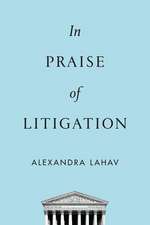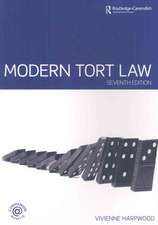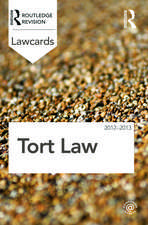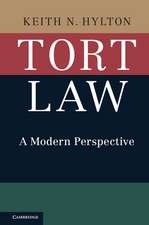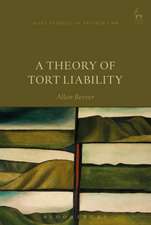Fundamental Rights and Private Law in Europe: The case of tort law and children
Autor Nuno Ferreiraen Limba Engleză Paperback – 12 apr 2013
| Toate formatele și edițiile | Preț | Express |
|---|---|---|
| Paperback (1) | 416.22 lei 6-8 săpt. | |
| Taylor & Francis – 12 apr 2013 | 416.22 lei 6-8 săpt. | |
| Hardback (1) | 1064.01 lei 6-8 săpt. | |
| Taylor & Francis – 17 mai 2011 | 1064.01 lei 6-8 săpt. |
Preț: 416.22 lei
Nou
Puncte Express: 624
Preț estimativ în valută:
79.65€ • 82.69$ • 66.42£
79.65€ • 82.69$ • 66.42£
Carte tipărită la comandă
Livrare economică 25 martie-08 aprilie
Preluare comenzi: 021 569.72.76
Specificații
ISBN-13: 9780415859295
ISBN-10: 0415859298
Pagini: 304
Dimensiuni: 156 x 234 x 20 mm
Greutate: 0.45 kg
Ediția:1
Editura: Taylor & Francis
Colecția Routledge
Locul publicării:Oxford, United Kingdom
ISBN-10: 0415859298
Pagini: 304
Dimensiuni: 156 x 234 x 20 mm
Greutate: 0.45 kg
Ediția:1
Editura: Taylor & Francis
Colecția Routledge
Locul publicării:Oxford, United Kingdom
Public țintă
Postgraduate lawCuprins
Introduction Part I 1.The Horizontal Effect of Fundamental Rights: Theories and Models 2. Tort Law: Aims, Functions and Evolution 3. The Horizontal Effect of Fundamental Rights and Tort Law: What about the Tortfeasor? Part II 4. The Fundamental Rights of Children: International, European and National Perspectives 5. Children’s Torts: European National Legal Solutions 6. Children’s Tortious Liability in Europe: Comparison, Critique and Proposals. Conclusion
Recenzii
"Drawing on a range of legal and non-legal fields, including feminist studies, psychology, and sociology, Ferreira explores the "horizontal effect" of fundamental rights in private law (also referred to as "external effect," "third-party effect," "Drittwirkung," etc.) in selected European jurisdictions (French, Italian, German, Portuguese, Swedish, Finnish, English, and Welsh). He contributes to the ongoing debate about this subject by examining the neglected area of tort law from the point of view of the tortfeasor, illustrating this general discussion with a more focused consideration on the tortuous liability of children. The topic is addressed at the international, European, and national levels and also brings in relevant aspects of other legal fields, including human rights law, constitutional law, and child law."—Book News
Descriere
The book explores the relationship between fundamental rights and private law in Europe, a debate usually referred to as Drittwirkung or ‘horizontal effect of fundamental rights’. The work focuses on the field of tort law and looks, in particular, at the legal position of the tortfeasor. Part I of the book is dedicated to exploring the different possible models of Drittwirkung, the functions and evolution of tort law, and the particular impact that fundamental rights may have in shaping the legal consequences that may derive to tortfeasors from their tortious acts. Part II focuses on the relationship between children’s tortious liability and their fundamental rights in a number of jurisdictions including France, Italy, Germany, Portugal, Sweden, Finland, and England and Wales. The book goes on to consider policy implications and advances proposals which would ensure the optimisation and maximisation of the scope of fundamental rights in the field of tort law.


